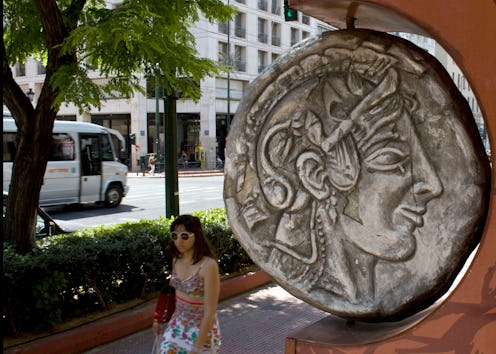News
These Are Greece's Currency Options
Greece has officially voted against an austerity plan that would have bailed the country out of debt but came with stringent regulations including possible tax hikes and budget cuts. A little over 60 percent of citizens voted against the bailout. Prior to the final votes being tallied, officials said that Greece had no plans to introduce a new currency nor were they willing to implement a parallel currency. The bailout rejection changes everything, however. It's considered an oppositional move that may push the country out of the eurozone altogether. So, what money would Greece use if they left the eurozone?
One option may be what Greece had previously had before adopting the euro. The country originally became a part of the European Union in 1981 and joined the eurozone 20 years later. Prior to that, Greece's official currency was the drachma and was first adopted in 1827. Its value had significantly declined leading up to the country's admittance to the eurozone and experts predict that if Greece reverts to the drachma following the bailout rejection, a similar depreciation will follow. Barclays predicts as much as an 85 percent devaluation based on historic data, though according to UBS global economist Paul Donovan, the country's current financial position may be what devalues the drachma the most:
You need credit to do trade finance and which bank in their right mind is going to give Greece credit on short term trade finance? I would suspect that very few people will be prepared to exchange the drachma for very much.
An alternate scenario for Greece would involve the introduction of a parallel currency rather than a new form of money adopted nationwide. With the rise in popularity and acceptance of Bitcoin, it's only fitting that a potential option be made digitally rather than tangibly. The island of Agistri is already implementing such currency, according to Forbes. The mayor is letting businesses use an online loyalty program via Drachmae Connect rather than insisting upon using Euros. The island's ATM has been empty for over a week, making it impossible to withdraw the 60 Euro limit currently being implemented. Thus, a currency requiring no withdrawal and not susceptible to the current financial crisis certainly sounds more appealing.
The move is primarily geared towards visiting tourists and businesses who rely on foreign guests. For the rest of the country, Drachmae Connect founder Lee Gibson-Grant suggests using a mobile banking service that Greece may be able to prevent from devaluing by backing it with raw assets. "When looking at the current situation of Greece it has no choice but to create a parallel currency to take the stress off of requiring bailouts," Gibson-Grant tells Forbes.
A digital currency would be cheaper and potentially faster to implement due to the fact that no money would need to be printed. Nonetheless, the country appears to be more focused on bailout negotiations than changing the very money they use altogether. Prime Minister Alexis Tsipras issued a statement following the "no" vote supporting Greece and declaring that the move puts them in a better position to pay back loans without having to implement austerity measures. The country continues to be in flux, however, and a eurozone summit on Greece's financial crisis and bailout vote is scheduled on Tuesday.
Images: Getty Images (2)
